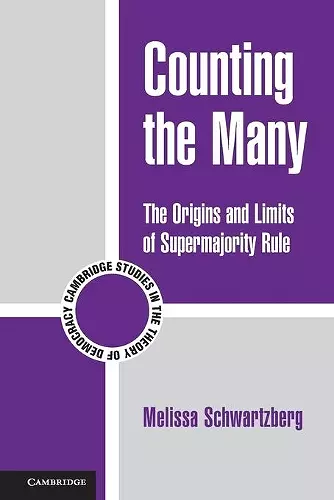Counting the Many
The Origins and Limits of Supermajority Rule
Format:Paperback
Publisher:Cambridge University Press
Published:18th Nov '13
Currently unavailable, and unfortunately no date known when it will be back
This paperback is available in another edition too:
- Hardback£75.00(9780521198233)

Examines the history underlying the use of supermajority voting rules and offers a critique of their ability to remedy the defects of majority decision making.
Supermajority rules govern many features of our lives in common: from the selection of textbooks for our children's schools to residential covenants, from the policy choices of state and federal legislatures to constitutional amendments. It is usually assumed that these rules are not only normatively unproblematic but necessary to achieve the goals of institutional stability, consensus, and minority protections. In this book, Melissa Schwartzberg challenges the logic underlying the use of supermajority rule as an alternative to majority decision making. She traces the hidden history of supermajority decision making, which originally emerged as an alternative to unanimous rule, and highlights the tensions in the contemporary use of supermajority rules as an alternative to majority rule. Although supermajority rules ostensibly aim to reduce the purported risks associated with majority decision making, they do so at the cost of introducing new liabilities associated with the biased judgments they generate and secure.
“As she did in her previous, remarkable book on entrenchment provisions, Democracy and Legal Change, Melissa Schwartzberg, in Counting the Many, shows us how little we really understand a widespread practice in modem constitutionalism, in this case supermajoritarianism. Combining sharp rational analysis and subtle historical research, Schwartzberg illuminates the origins of vote counting and the decision rules that developed along with it. Normatively, the book is courageous: Schwartzberg demonstrates in no uncertain terms that there is no justification compatible with democratic principles for supermajority requirements. Historically, the book is revelatory in several respects: for instance, Schwartzberg informs us that ‘one person, one vote’ was originally an aristocratic, not democratic, principle. Counting the Many is an excellent book that will enjoy an enormous scholarly and, hopefully, political impact.” – John P. McCormick, Professor of Political Science, University of Chicago
- Winner of David and Elaine Spitz Prize, International Conference for the Study of Political Thought 2016
ISBN: 9780521124492
Dimensions: 215mm x 139mm x 14mm
Weight: 300g
248 pages